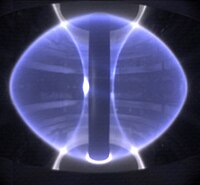
Photo from wikipedia
In this article, the interest is on the fusion of labeled random finite set (LRFS) densities computed by sensors having different fields of view (FoVs). In order to deal with… Click to show full abstract
In this article, the interest is on the fusion of labeled random finite set (LRFS) densities computed by sensors having different fields of view (FoVs). In order to deal with different FoVs of the local densities, the global label space is divided into disjoint subspaces, which represent the exclusive FoVs and the common FoV of the agents, and a method based on the minimization of the Kullback–Leilber divergence from the resulting factorized density to the original one is proposed to decompose each local density into the subdensities defined in the corresponding subspaces. Then, fusion is performed according to a constrained minimum information loss criterion: the local subdensities are fused, subspace by subspace, into global ones, and the global density is obtained by multiplying the global subdensities. The application of the proposed approach to two important types of LRFS density, i.e., marginalized $\delta$-generalized labeled multi-Bernoulli and labeled multi-Bernoulli densities, is developed in this article. Furthermore, in order to tackle the label mismatching issue arising in practical applications, an assignment optimization of a suitably defined cost is carried out so as to match labels from different agents. Finally, the performance of the proposed fusion approach is assessed via simulation experiments.
Journal Title: IEEE Transactions on Aerospace and Electronic Systems
Year Published: 2022
Link to full text (if available)
Share on Social Media: Sign Up to like & get
recommendations!